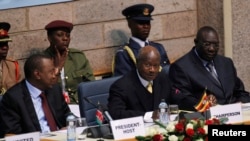NAIROBI —
Leaders from the Great Lakes region are calling for greater cooperation to bring peace to the Democratic Republic of Congo, as accusations of interference by neighboring countries continue to fly.
Regional heads of state met in Nairobi Wednesday to build on a framework agreement signed by members of the International Conference of the Great Lakes Region (ICGLR) in February, which outlines steps to advance regional peace efforts — including a pledge not to interfere in the internal affairs of neighboring countries.
This pledge is under the spotlight in the eastern Democratic Republic of Congo, where U.N. peacekeepers are increasing pressure on M23 rebels.
The United Nations, rights groups and some western countries have accused Rwanda and Uganda of supporting rebel groups in the DRC, including M23.
U.N. Special Representative to the Great Lakes, Mary Robinson, told the summit she hopes this meeting will lead to an end for that support.
"The activities in support of armed groups by different signatory parties to the framework are contrary to the spirit and intent of the framework and must stop," she said.
Rwanda and Uganda, both ICGLR members, deny accusations of supporting rebels.
Ugandan President Yoweri Museveni, who is also current ICGLR chairman, said it is up to Congolese government officials to stop insecurity in the country.
"Unfortunately the DRC has not created an army to effectively control its territory to guarantee internal security and to guarantee its territory is not used by negative forces to destabilize her neighbors," he said.
For the past few weeks, the Congolese army has been on the offensive against M23 rebels, who briefly seized the city of Goma last year and continue to control territory in eastern Congo.
The U.N. peacekeeping mission in the Congo, known as MONUSCO, has been providing support to the army and is deploying a new brigade with a mandate to take offensive action against rebel groups, including M23.
On Tuesday, MONUSCO issued a statement calling for armed groups in Goma and the northern suburbs to hand in their weapons, mentioning repeated attacks by M23 against army positions.
Speaking to VOA Wednesday, Bertrand Bisimwa, president of M23, questioned the declaration's timing.
"We are surprised by this decision, by this declaration of MONUSCO, because this declaration is done while we are in the peace process with the government of Kinshasa," he said. "And when on the frontline, war has stopped."
Bisimwa said M23 will maintain its positions despite the warning, but said they will not attack the Congolese army or MONUSCO.
Peace talks between M23 and the Congolese government, launched after the attack on Goma last year, have stalled with the latest round of fighting this month.
Regional heads of state met in Nairobi Wednesday to build on a framework agreement signed by members of the International Conference of the Great Lakes Region (ICGLR) in February, which outlines steps to advance regional peace efforts — including a pledge not to interfere in the internal affairs of neighboring countries.
This pledge is under the spotlight in the eastern Democratic Republic of Congo, where U.N. peacekeepers are increasing pressure on M23 rebels.
The United Nations, rights groups and some western countries have accused Rwanda and Uganda of supporting rebel groups in the DRC, including M23.
U.N. Special Representative to the Great Lakes, Mary Robinson, told the summit she hopes this meeting will lead to an end for that support.
"The activities in support of armed groups by different signatory parties to the framework are contrary to the spirit and intent of the framework and must stop," she said.
Rwanda and Uganda, both ICGLR members, deny accusations of supporting rebels.
Ugandan President Yoweri Museveni, who is also current ICGLR chairman, said it is up to Congolese government officials to stop insecurity in the country.
"Unfortunately the DRC has not created an army to effectively control its territory to guarantee internal security and to guarantee its territory is not used by negative forces to destabilize her neighbors," he said.
For the past few weeks, the Congolese army has been on the offensive against M23 rebels, who briefly seized the city of Goma last year and continue to control territory in eastern Congo.
The U.N. peacekeeping mission in the Congo, known as MONUSCO, has been providing support to the army and is deploying a new brigade with a mandate to take offensive action against rebel groups, including M23.
On Tuesday, MONUSCO issued a statement calling for armed groups in Goma and the northern suburbs to hand in their weapons, mentioning repeated attacks by M23 against army positions.
Speaking to VOA Wednesday, Bertrand Bisimwa, president of M23, questioned the declaration's timing.
"We are surprised by this decision, by this declaration of MONUSCO, because this declaration is done while we are in the peace process with the government of Kinshasa," he said. "And when on the frontline, war has stopped."
Bisimwa said M23 will maintain its positions despite the warning, but said they will not attack the Congolese army or MONUSCO.
Peace talks between M23 and the Congolese government, launched after the attack on Goma last year, have stalled with the latest round of fighting this month.









